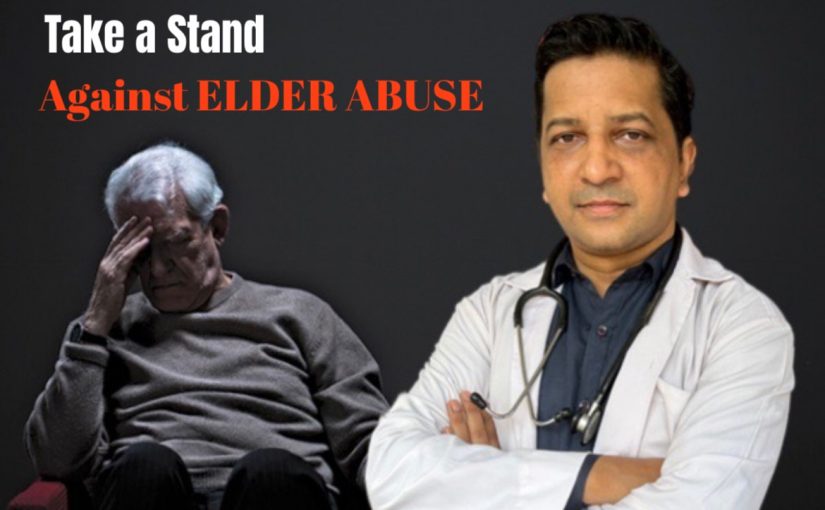June 15 is observed as “World Elder Abuse Awareness Day.” We must understand this day in the context of our senior family members at our home and in our society. DR AMIT DIAS, from the Department of Preventive & Social Medicine, Goa Medical College & Hospital has been working with citizens for several years, and urges everyone to take a stand against elder abuse. You may call up Elder Helpline for support –14567.
A question/answer session for Goan Observer…
QUESTION: Doctor, could you elaborate on the term “Elder Abuse” and why we need to observe this day?
ANSWER; According to the WHO, elder abuse is defined as a single or repeated act or lack of appropriate action, occurring within any relationship, where there is an expectation of trust, which causes harm or distress to the elder person. Elder abuse tends to remain a hidden problem in many households.
However, we have evidence that it is on the rise and the United Nations has taken cognizance of the same and decided to observe June 15 as the Elder Abuse Awareness Day so that people understand what constitutes abuse — and the fact that we need to take a stand against the abuse of our senior citizens. It is one of our important public health and social problems that need to be recognized.
In case you are subjected to abuse or you know of any such incident, call up the National Elder Help line for support — dial 14567. They will listen, respond and provide legal guidance as well.
Q: What exactly constitutes elder abuse?
A: Abuse of the elderly can be of several types.
PHYSICAL ABUSE: This involves actions such as hitting, slapping, pushing, restraining, locking them in a room, tying them, etc.
EMOTIONAL ABUSE: Threatening, shouting, verbally abusing, not letting them meet their relatives and friends, taunting them.
SEXUAL ABUSE: Here the abuser may show them sexually explicit material against their wishes or force them into sexual acts.
NEGLECT & ABANDONMENT: The elder may be neglected, and the caregiver does not give medication, food, medical check-up, etc. In worse case scenarios they may abandon elderly patients without proper planning for their caretaking.
FINANCIAL ABUSE: The caretaker may steal or fraudulently transfer elder’s property, etc, in their name and make the elderly dependent on them.
Q: How big is the problem?
A: Studies have revealed that one in six people (15.7%) above the age of 60 are subject to abuse. There are reports that instances of abuse might have increased during the COVID-19 pandemic. Remember that it is not something that only happens to the frail and the sick… it can happen to anyone…even in higher socio-economic households. Those who are dependent and have chronic sickness are indeed more likely to be abused. Studies have revealed that 2 out of 3 people with dementia have been abused. Women are more likely to be abused and they suffer in silence. Speaking about it is a taboo grounded in cultural prejudices, stereotypes and unequal power dynamics.
While I was doing my research on the elderly in the community in the state of Goa, I came across several instances of abuse. Very often it is the result of a lack of knowledge of how to look after the elderly and the feeling that it is OK to abuse. When the family was offered counseling, they realized that it was incorrect and found better solutions to deal with the situation. 90% of the abuse happens at home. Most abusers are spouses and adult children, especially if they are alcoholics. Just 4% of the abuses are reported. Studies have shown that victims of abuse are twice as likely to die compared to others. The WHO estimates that at the current rate, the numbers will rise to 320 million victims by 2050 when the aged population will reach 2 billion.
Q: What are the consequences of abuse?
A: Abuse can have serious physical, mental, social, and financial consequences. It can also cause premature mortality, depression, memory problems, and financial problems. It may also result in suicide.
Q: Is there a theme for this year?
A: The theme this year is “Closing the Circle: Addressing Gender-Based Violence in Older Age Policy, Law and Evidence-based Responses.” The focus is on violence against elder women and we need to start by acknowledging that it exists, recognizing the signs and taking a stand against it.
Q: What can our readers do to stop elder abuse?
A: People in general should learn to recognize the signs of elder abuse and neglect — bruises, no food in the house, elder not meeting anyone, large amount of money withdrawn from their bank account could be signs that something may be wrong.
People working in banks must be trained and vigilant to notice any financial abuse of the elderly
Doctors and nurses should inquire with the elder about any abuse. Elders often consider it to be their destiny and suffer the abuse in silence. Create awareness so people understand what is elder abuse and the consequences of the same. Ensure that the elders are aware of their rights and the professional services they can avail in case of any abuse. They need to stay connected with friends.
Care for the caregivers and provide them with a break, recognize signs of burnout in caregivers as that may result in abuse and neglect. Create a supportive environment that prevents situations where elders are abused.
Visit the elderly, speak to them and encourage senior citizens to meeting spots in the parks.
Let us all take a stand against elder abuse to build a better society for the future!
